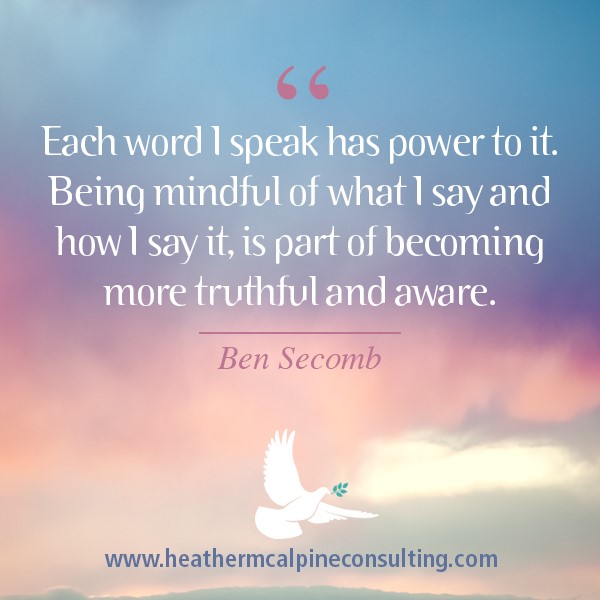Our words are so powerful. Words can hurt. But they can also heal.
Starting an argument is easy, … preventing it or stopping it is hard.
Here’s a great quote that reminds us of the importance of our words:
“This sense of being at home is important to everybody’s well being. If you don’t get enough of it, your happiness, resilience, energy, humour, and courage will decrease. Home is the one place in the world where you are safe from feeling put down or out, unentitled or unwanted. Coming home is your major restorative in life.”
(from home conflicts: the art and science of keeping house):
We have observed friends or experienced times in our own relationship where the home has not been a haven due to criticism, harshness, anger and blame.
If this is the case, we need to change our worldview and change our thinking.
There are a few things we can do to use our words to heal, rather than hurt.
1. Learn what happens to prevent an argument
We could ask ourselves before launching into an argument;
Is it actually worth it?
Does this build a safe space for my partner?
Is coming home to me, restorative to my partner?
Are my actions building our home as a safe haven?

2. Learn what happens to stop an argument
Do you know what your partner needs in order for an argument to stop?
John Gottman, the marriage researcher, discovered that he could tell within 1 minute how a couple interaction would end.
He coined the phrase soft start-ups.
For an example, in the first year of our marriage, I would be home sometimes, all day studying, having negative feelings having to put John’s breakfast stuff away then surrounded by mountains of his dirty underwear.
I would have my emotional aggro shotgun and my nagging shotgun leaning against the door of our flat.
As soon as I heard “Honey I’m home,” I’d give him both barrels…
“Look at this mess, yet again, I’ve got no room to tread on the floor…. I’m constantly cleaning up after you!”
Needless to say, the interaction didn’t end well.
Perhaps a soft start-up would be, “Honey I’ve missed you. Let’s make love”.
But I think that would be too soft a start-up.
Let’s go through some other soft start-up approaches.
With my husband, John, if I say the words, “You’re right”, the argument stops immediately!
Seriously though, in the old days when we struggled, what helped to stop an argument from going further was if I was too upset to stay in the room with him, and I’d go somewhere else to cry…
I know this sounds odd; …. but I actually needed him to follow me.
This was a foreign concept to John for years – he would stay behind thinking, “I’m not going to put my head inside the door – it would only get bitten off. I’ll wait out here till Heather calms down and try again.”
Meanwhile, I would be in the room alone; feeling uncared for, and the feeling sunk deeper, feeling a total lack of love.
I want to acknowledge that for many people when they walk away upset, they really need their space.
For me – I need my space for a few minutes only, and then I like to be comforted. It’s the comforting that reminds me we’re on the same side.
It’s about openly communicating what we need.
The other thing that can help to short circuit an argument is humour.
This takes a lot of fine-tuning, but when the heat drops and the emotional level quietens down and we can start to see the funny side of things, the remaining feelings dissipate.
Sometimes, people try to lighten things up before trying to resolve the issue – which is not always a pretty sight.
It can escalate the conflict if one partner feels like the other is not taking a situation seriously that is important to them.
(as my husband John says, premature joke-ulation!)
For John, to help him to stop an argument, he needs me to acknowledge his opinion, even (and especially!) when it’s quite different to mine. It’s so important that we acknowledge what we hear our partner express. We don’t have to agree with them. Because I respect John, I want him to know that what he has to say is valuable. It matters. And when that is shown, he can continue the discussion, even if he doesn’t agree with me.
3. Stay you, while you’re both together.
Often, couples try to prop each other up from a wobbly place.
This doesn’t work.
If you’re both working on being the strongest and most loving version of yourselves, you will better be able to connect and provide each other stability.
Next time your partner is upset with an event external to your relationship or within your relationship, try calming yourself first so you are not just wearing their emotion and reacting to it.
Practise being the best version of you, even when you don’t always feel like it.
The healthier your relationship is with yourself, the healthier it will be with your spouse.
There are many other ways we can learn to communicate more effectively in our marriage to enrich and restore the relationship.
Is your marriage being negatively affected by the way you’re speaking to each other?
Or is your marriage going well, but you’d like to bring in even more harmony, love and connection?
We’d love you to join us on our Couples Getaway Weekend coming up in September.
It’s a deep-dive into how to keep your connection, love, and romance alive.
John and I have been running marriage seminars for over 30 years in multiple countries. We love helping couples have stronger, healthier and more loving marriages.
Learn More about our Couples Getaway

We’d love to see you there!
Heather